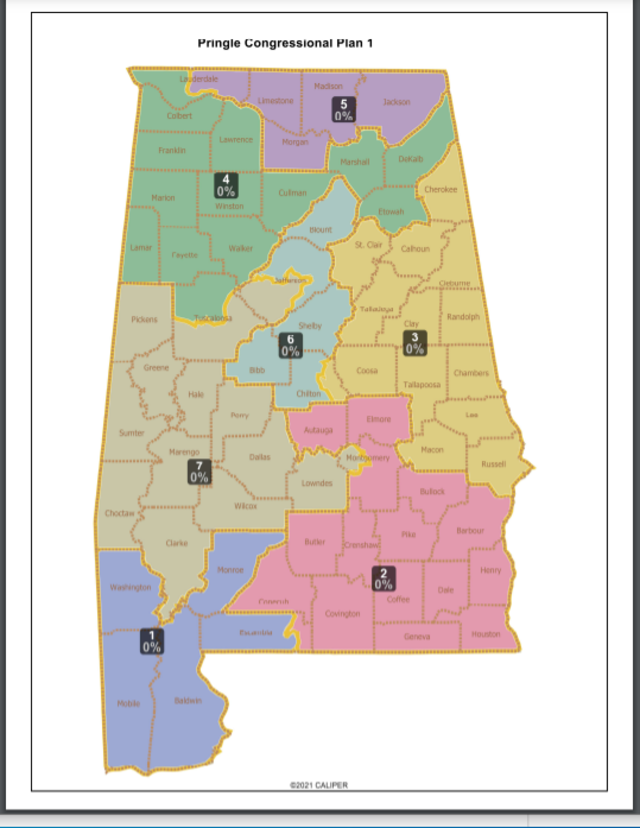On February 7, 2022, the Supreme Court, in a 5-4 decision, ruled that a potentially illegal congressional map of Alabama may be used in the upcoming 2022 election. Critics of this decision point out the blatant race-packing under the proposed map, where Black voters would only be the majority in one out of seven congressional districts though they make up just over 25% of Alabama’s total population. However, is this just regular reapportioning or is this an attack on democracy as we know it?
It is important to identify if the Supreme Court’s decision is 1) justified, 2) directly eroding democracy and 3) enabling the eroding of democracy. First, is the Supreme Court’s decision justified? The Supreme Court has already decided in the past that partisan gerrymandering is constitutional, but it has ruled against racially gerrymandered maps as recently as 2017 in North Carolina (Cooper v. Harris). However, this can become difficult in some cases, as race can be often correlated with a certain party preference. While many critics of Alabama’s map point out the heavy racial biases of this map, perhaps the map was done primarily politically (though this is highly unlikely). It is important to remember that the Supreme Court did not determine whether the map was lawful or not; they instead claimed that it was too close to the election to redo the map. No two individuals can agree on what constitutes “too close” to an election, as it is an arbitrarily decided date. As this is something that can be debated, one must assume that the Supreme Court did this with noble intentions unless proved otherwise. Thus, while this decision may or may not be arguably justified, the Supreme Court is not blatantly eroding democracy because this is in line with what the Supreme Court has done in the past: postponing cases and attempting not to get involved in politics. However, that does not mean that the politicians who proposed this map are not attempting to erode democracy. As Associate Professor of Law Ozan O. Varol wrote, “gerrymandering of election districts provide fertile grounds for stealth authoritarianism” [1]; after all, one only needs to look to much of southern United States in the 1900s and early 2000s for an example.

While we have reached the answer to my first two question, this does not address my last key question: whether this decision opens the possibility to democratic backsliding. I argue that while the Supreme Court is not directly eroding democracy (or we do not have sufficient evidence to conclude that they are), it opens the floodgates for potential bad actors to take advantage purposely exhibit behavior that erodes democracy for malicious means. Because the Supreme Court is allowing Alabama to use a map which has been ruled unlawful, the Supreme Court is signaling to other politicians that they can draw up gerrymandered congressional maps without any punishment. Authoritarians in the past—in an attempt to entrench themselves in power—will “change the rules of the game” as Harvard Professors Levitsky and Ziblatt coined. Gerrymandering is one of the many tools in their arsenal to accomplish this stealth authoritarian. In 2004, the ruling UMNO of Malaysia helped their coalition to win 91% of parliamentary seats after redrawing districts to be Malay-dominant in most regions. Orban and his Fidesz party did a similar thing after winning a 2/3 parliamentary majority in 2010 to lock in their majority. [2] While they are not leading a bloody coup nor declaring certain citizens to have less of a vote than their peers, these governments were essentially able to accomplish the latter measure by redrawing maps to their political gain.
With how much I have focused on democratic erosion, I would be remiss to not properly define what this beacon of a political system is. While democracy does not have a universal definition, many agree with political scientist Robert Dahl’s definition: Robert Dahl—a political science professor at Yale for 40 years—championed a “thick” definition of democracy, which is a representative government where the people are well informed, and their political rights are protected. One such right Prof. Dahl outlines is the right to vote. A gerrymandered map prevents or diminish a state’s or region’s populace from having their voice heard in elections. Whether done for racial purposes or political purposes, this cannot stand, as it is an attack on democracy as we know it.
While we may not know exactly if the Supreme Court is attempting to erode democracy themselves, we can be certain that they are enabling the potential backsliding of democracy. However, there may be hope in our judicial checks-and-balances system. While the Supreme Court that made this decision has a conservative majority, the three-judge panel that originally ordered Alabama’s new congressional map to be changed consisted of two judges appointed by President Donald Trump, which clearly demonstrates that some judges still possess the ability to break from political interests and rule for what is best for democracy. Now, more than ever, American judges and the populace must be vigilant in congressional redistricting. While redistricting for political purposes unfortunately has a long history in the United States (and many polarized Americans increasingly do not care about gerrymandering if done by their party, according to an experiment by Yale Political Science Professor Svolik and Graham[3]), we must not allow blatant race-packing into a single district and the invaliding of over 25% of a state’s populace the right to an equal vote, one of the most essential traits of a democracy.
[1] Ozan Varol, “Stealth Authoritarianism,” Iowa Law Review 2015. [2] Levitsky, Steven, and Daniel Ziblatt. How Democracies Die. Penguin Books, 2019. [3] Matthew Graham and Milan Svolik. “Democracy in America?: Partisanship, Polarization, and the Robustness of Support for Democracy in the United States,” American Political Science Review, 2020.
0 Comments